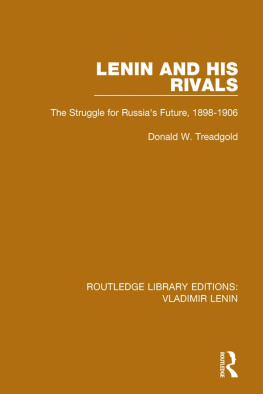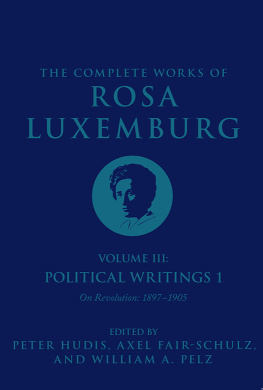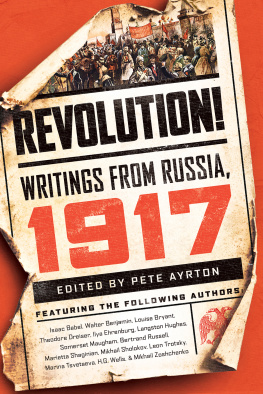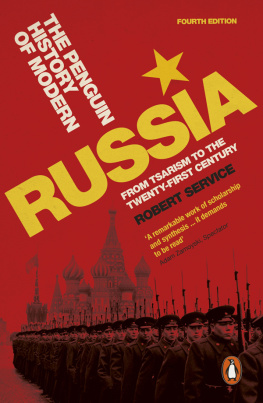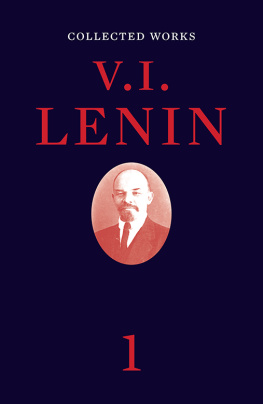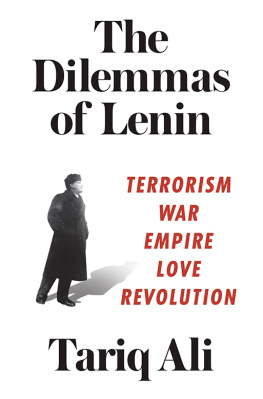ROUTLEDGE LIBRARY EDITIONS: VLADIMIR LENIN
Volume 6
LENIN AND HIS RIVALS
LENIN AND HIS RIVALS
The Struggle for Russias Future, 18981906
DONALD W. TREADGOLD
First published in 1955 by Methuen & Co. Ltd
This edition first published in 2017
by Routledge
2 Park Square, Milton Park, Abingdon, Oxon OX14 4RN
and by Routledge
711 Third Avenue, New York, NY 10017
Routledge is an imprint of the Taylor & Francis Group, an informa business
1955 Donald W. Treadgold
All rights reserved. No part of this book may be reprinted or reproduced or utilised in any form or by any electronic, mechanical, or other means, now known or hereafter invented, including photocopying and recording, or in any information storage or retrieval system, without permission in writing from the publishers.
Trademark notice: Product or corporate names may be trademarks or registered trademarks, and are used only for identification and explanation without intent to infringe.
British Library Cataloguing in Publication Data
A catalogue record for this book is available from the British Library
ISBN: 978-0-415-79274-5 (Set)
ISBN: 978-1-315-20438-3 (Set) (ebk)
ISBN: 978-1-138-63680-4 (Volume 6) (hbk)
ISBN: 978-1-315-20570-0 (Volume 6) (ebk)
Publishers Note
The publisher has gone to great lengths to ensure the quality of this reprint but points out that some imperfections in the original copies may be apparent.
Disclaimer
The publisher has made every effort to trace copyright holders and would welcome correspondence from those they have been unable to trace.
Lenin
and his Rivals
THE STRUGGLE FOR
RUSSIAS FUTURE, 18981906
by
DONALD W. TREADGOLD
METHUEN & CO. LTD
36 Essex Street, Strand; London, WC2
First published in 1955
To the Memory of
Bernard Humphrey Sumner
TABLE OF CONTENTS
If thought once masters a man, he ceases to discuss whether the thing is practicable, and whether the enterprise is hard or easy: he seeks truth alone and carries out his principles with inexorable impartiality
ALEXANDER HERZEN, My Past and Thoughts.
The dialectic of history is of such a kind that the theoretical victory of Marxism compels its enemies to reclothe themselves as Marxists.
VLADIMIR LENIN, The Historical Fate of the Teaching of Karl Marx.
Without knowing the people we may oppress the people, we may enslave them, we may conquer them, but we cannot set them free.
Without the help of the people they will be freed neither by the Tsar with his clerks, nor the nobility with the Tsar, nor the nobility without the Tsar.ALEXANDER HERZEN.
In the summer of 1891 there appeared in the Russian press a letter from a priest of Kazan province reporting that a large number of his communicants were starving. Other such reports followed swiftly. That year and the next, the worst famine in decades swept through Central and Southern Russia, and Russias educated classes rose almost as one man to succor the common people who were dying.
Alexander Herzen long before in London, far away from his homeland, had pondered the problem of Russias misery and backwardness, and its need for a social transformation. Filled with frustrated eagerness to close the stupendous gap between Russian reality and his own ideal vision of the future, he had hurled at his fellow intellectuals the command, To the people! in his famous newspaper, The Bell.countryside than the workers of Western Europe. The peasants, whether or not partially displaced to urban centers, were by no means despised by the Tsardom, which regarded them as its unshakably loyal subjects, obedient to the earthly order as they had been from ancient times to the crooked cross of Russian Orthodoxy. They were by no means always maltreated by their landlords, many of whom took seriously the injunctions of Russias eighteenth-century monarchs to care conscientiously for the welfare of their charges. Nor were they forgotten by the Russian intelligentsia, who from the time of their first progenitors under Catherine the Great had always had at least one feeling in commonpity for the plight of the serfs, joined to the firm resolve to better it somehow. Yet though not despised or forgotten, the people were still, perhaps even more than their ancestors, hovering on the margin of existence. Over this margin, calamities like the famine of 1891 might unopposed sweep death and ruin, God only knew when.
Separated from the people by an abyss of education, outlook, and languagethe external marks of radically differing social and economic positionwas the relatively small but influential body of respectable men who made up what was delicately called Russian societyobshchestvo. Along with the noble landlords who made up the uniquely privileged class, this group included the fast-growing nucleus of industrialists, the men of the trained professions, as highly revered though not as well paid as their German confreres, and the government officials. Among the respectable men of Russia were to be found many who lived off the toil of the poor, though some of these very exploiters sought to end such a system, and as a whole society can be said to have wrestled with feelings of responsibility for Russias ills.
Yet it was not society as such which Herzen urged to take up the burden of going to the people. It was rather the intelligentsia. Much ink has been spilt over the difficulties of this term. The intelligentsia,position, but rather a degree of education, no matter how acquired, and a deep interest in social problems. The opposite pole of the people, sociologically speaking, was society; culturally speaking, it was the intelligentsia. These two groups overlapped, and for that reason it becomes the more difficult to follow the threads of Russias social transformation, in Herzens phrase. What is most interesting about the outcome, perhaps, is that in terms of the future, the intelligentsia may be viewed as an essentially extra-economic group which was openly seeking political powerhowever unselfishly, in however democratic a frameworkwhile at the same time many of its spokesmen asserted that politics was a function of economics and that meaningful political activity could only be conducted in terms of economic categories. The section of the intelligentsia which insisted most strongly on this point, the Bolsheviks, was precisely that which succeeded at last in capturing political power.

